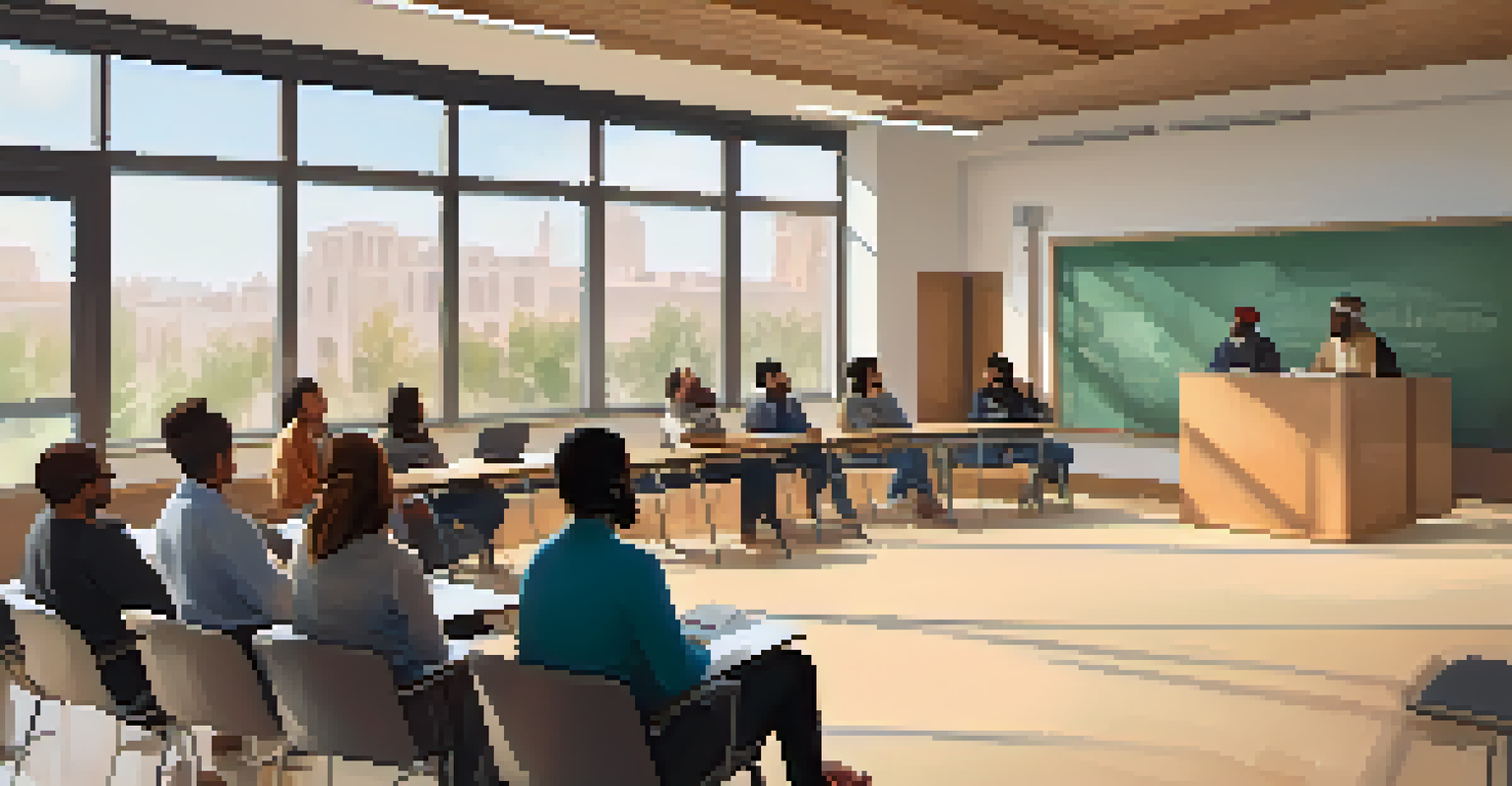The Role of Education in Promoting Interfaith Dialogue

Understanding Interfaith Dialogue and Its Importance
Interfaith dialogue refers to the open and respectful exchange of ideas between individuals from different religious backgrounds. It plays a crucial role in promoting peace and understanding in our increasingly diverse world. By engaging in these conversations, we can learn about each other’s beliefs and values, which helps to break down stereotypes and misconceptions.
Dialogue is the most effective way to resolve conflict and misunderstandings, and it is key to building bridges between communities.
The importance of interfaith dialogue cannot be overstated; it creates bridges between communities that might otherwise remain isolated. When people understand and respect each other's beliefs, they are less likely to engage in conflict. This understanding fosters a sense of shared humanity, making it easier to work together towards common goals.
Education serves as the foundation for encouraging interfaith dialogue. Through formal education, individuals gain the knowledge and skills necessary to engage in meaningful conversations. Without this educational groundwork, people may struggle to communicate effectively across religious lines.
The Role of Schools in Promoting Interfaith Understanding
Schools are often the first place where children encounter diverse cultures and beliefs. By incorporating interfaith education into the curriculum, schools can teach students the importance of respect and tolerance from a young age. This early exposure helps foster an environment where questions about different faiths are welcomed and encouraged.

Moreover, schools can host interfaith events, such as guest speakers or cultural fairs, that allow students to learn directly from individuals of different backgrounds. These initiatives create opportunities for students to engage with diverse perspectives in a safe and supportive setting. Such interactions can lead to lasting friendships and a deeper understanding of one another.
Interfaith Dialogue Promotes Peace
Engaging in interfaith dialogue fosters understanding and respect, helping to break down stereotypes and reduce conflict among diverse communities.
Additionally, teachers play a vital role in shaping students' attitudes towards diversity. By modeling respectful dialogue and encouraging critical thinking, educators can inspire students to appreciate differences. This approach not only enhances social cohesion but also promotes a culture of peace.
Higher Education's Impact on Interfaith Dialogue
Higher education institutions are uniquely positioned to promote interfaith dialogue among young adults. With students coming from various religious backgrounds, universities can create forums for discussion and collaboration. These interactions allow students to explore complex issues related to faith, identity, and social justice.
The highest form of wisdom is kindness, and we can only foster this through understanding one another's beliefs and values.
Many universities offer courses specifically focused on religious studies, ethics, and interfaith relations. These programs equip students with the knowledge and skills to navigate a diverse world. By engaging in academic discourse about different faiths, students learn to appreciate multiple viewpoints and develop a more nuanced understanding of global issues.
Furthermore, campus organizations dedicated to interfaith dialogue can facilitate meaningful conversations and collaborations. By participating in these groups, students can share their experiences and perspectives while learning from others. This exchange fosters empathy and promotes a sense of community among individuals of varying beliefs.
Community Programs That Foster Interfaith Dialogue
Community programs play an essential role in encouraging interfaith dialogue beyond the classroom. Local organizations often host events that bring together individuals from different faith traditions to share meals, stories, and traditions. These gatherings create an informal setting where participants can connect on a personal level.
Moreover, workshops and seminars focused on interfaith issues can help participants develop skills in conflict resolution and empathy. These programs often include activities that encourage participants to step into each other's shoes and understand different perspectives. This experiential learning is vital in promoting a culture of peace and understanding.
Education's Role in Interfaith Learning
Schools and higher education institutions play a crucial role in promoting interfaith understanding by integrating it into their curricula and encouraging open discussions.
Additionally, community leaders can act as facilitators in these dialogues, guiding discussions and ensuring that all voices are heard. Their involvement can help build trust and credibility within the community, making it easier for individuals to engage in open conversations about their beliefs.
The Role of Technology in Facilitating Interfaith Dialogue
In today's digital age, technology serves as a powerful tool for fostering interfaith dialogue. Social media platforms, blogs, and podcasts provide spaces for individuals to share their beliefs and experiences with a global audience. This accessibility allows for the exchange of ideas across borders, breaking down barriers that may exist in face-to-face interactions.
Online forums and discussion groups dedicated to interfaith topics enable participants to engage in meaningful conversations without geographical limitations. These virtual spaces can be particularly beneficial for individuals who may feel isolated in their local communities. By connecting with others online, they can find support and understanding.
However, it's essential to approach online dialogue with care. Misinformation can spread quickly, and discussions can sometimes turn hostile. Promoting respectful and informed conversations online is crucial to ensure that technology serves as a bridge rather than a barrier.
Challenges to Interfaith Dialogue in Education
Despite its many benefits, promoting interfaith dialogue in education comes with challenges. One significant hurdle is the fear of offending others or misrepresenting a particular faith. Educators and students alike may hesitate to engage in discussions for fear of backlash or misunderstandings.
Additionally, there may be a lack of resources or training for educators on how to facilitate interfaith dialogue effectively. Without proper guidance, discussions can become superficial or contentious, rather than fostering the understanding that is so vital. This gap highlights the need for professional development opportunities focused on interfaith education.
Technology Enhances Global Dialogue
In the digital age, technology facilitates interfaith dialogue by allowing individuals to share experiences and beliefs across geographical boundaries.
Moreover, students' preconceived notions and stereotypes can inhibit open dialogue. Overcoming these biases requires a concerted effort from both educators and students to create an environment where curiosity and respect are prioritized. Building this kind of atmosphere takes time, patience, and a commitment to continuous learning.
The Future of Interfaith Dialogue in Education
Looking ahead, the future of interfaith dialogue in education appears promising, especially as societies become more interconnected. As globalization continues to influence our lives, educational institutions must adapt to prepare students for a diverse world. Integrating interfaith education into various subjects can help students understand the complexities of global citizenship.
Moreover, collaborating with faith-based organizations can enhance educational initiatives focused on interfaith dialogue. These partnerships can provide valuable resources and expertise, ensuring that educational programs are comprehensive and inclusive. By working together, schools and communities can create a more cohesive approach to fostering understanding.

Ultimately, the goal of promoting interfaith dialogue in education is to cultivate empathy, respect, and cooperation among students. As future leaders, they will play a crucial role in shaping a more peaceful and inclusive world. By investing in interfaith education today, we can pave the way for a brighter tomorrow.